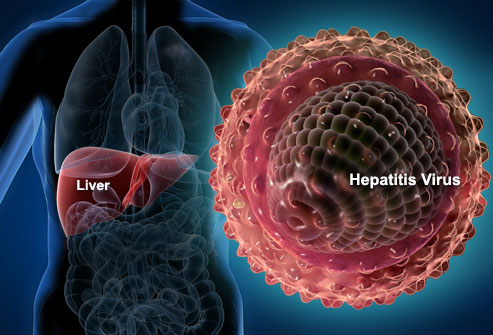
Hepatitis refers to an inflammatory condition of the liver. The condition can be self-limiting or can progress to fibrosis (scarring), cirrhosis or liver cancer.
It’s commonly caused by a viral infection, but there are other possible causes of hepatitis. These include autoimmune hepatitis and hepatitis that occurs as a secondary result of medications, drugs, toxins, and alcohol.
Autoimmune hepatitis is a disease that occurs when your body makes antibodies against the liver tissue.
There are 5 main hepatitis viruses, referred to as types A, B, C, D and E. these 5 types are of greatest concern because of the burden of illness and death they cause and the potential for outbreaks and epidemic spread.
In particular, types B and C lead to chronic disease in hundreds of millions of people and, together, are the most common cause of liver cirrhosis and cancer.
Hepatitis A and E are typically caused by ingestion of contaminated food or water. Hepatitis B,C and D usually occur as a result of parenteral contact with infected body fluids.
Common modes of transmission for these viruses include receipt of contaminated blood or blood products, invasive medical procedures using contaminated equipment and for hepatitis B transmission from mother to baby at birth, from family member to child, and also by sexual contacts.
Symptoms
- Jaundice (yellowing of the skin and eyes)
- Dark urine
- Extreme fatigue
- Nausea
- Vomiting
- Abdominal pain
Types of Hepatitis
Hepatitis A Virus (HAV) – present in the faeces of infected persons and is most often transmitted through consumption of contaminated water or food. Certain sex practices can also spread HAV.
Hepatitis B Virus (HBV) – is transmitted through exposure to infective blood, semen, and other body fluids.
Hepatitis C Virus (HCV) – mostly transmitted through exposure to infective blood.
Hepatitis D Virus (HDV) – infections occur only in those who are infected with HBV.
Hepatitis E Virus (HEV) – mostly transmitted through consumption of contaminated water or food.
Treatments
Hepatitis A Treatment – no treatment is needed for hepatitis A since the infection almost always resolves on its own.
Chronic Hepatitis B Treatment – treatment is aimed at controlling the virus and preventing damage to the liver. Antiviral medications are available that will benefit most people, but the medications need to be chosen carefully, and the treatment needs to be monitored in order to assure successful treatment and to prevent or treat medication-related side effects
- Monitoring Chronic Hepatitis
- Monitoring of the progression of liver disease and its treatment are the cornerstones of managing hepatitis B and C. Doctors regularly follow blood tests to determine how well the liver is functioning.
- Liver Transplant
- The liver serves many functions including the manufacture and removal of chemicals that allow cells to function normally, digestion of food, elimination of toxic chemicals, and the production of many proteins that the body needs. Thus, if a large portion of the liver is damaged, the liver cannot perform these critical functions; it is impossible to live without a liver. If the liver fails, a liver transplant may be the only hope.
- Hepatitis A and B Vaccines
- vaccines can protect against A and B. Vaccinations for hepatitis B should be given to people with hepatitis B and C
What We Offer
We at Almurshidi Medical Tourism will find the best doctors and hospitals to cater to your needs. We are partnered with a wide network of hospitals and clinics that provide top quality medical experience.
We provide free medical estimates, make medical appointments and provide several medical opinions if needed at no cost.
Contact Us
For more information contact us at +66822004040 or via WhatsApp







